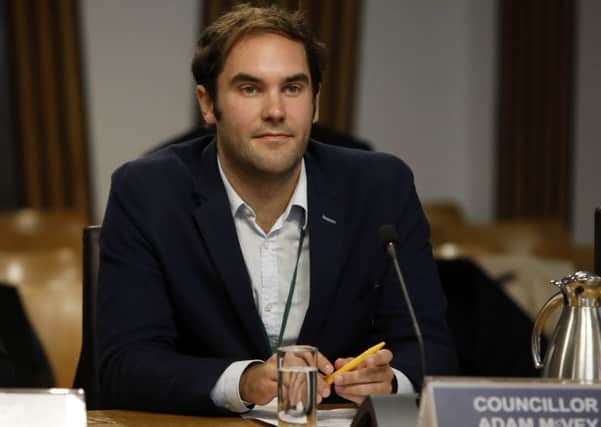Edinburgh council leader accused of '˜misleading public' on tourist tax


The council wants to introduce a tourism tax, branded a transient visitor levy (TVL), but the authority has failed to secure permission from the Scottish Government to do so.
In July, council leader Adam McVey said he would be “ready to go” with the tourist tax within 12 months. The boast resulted in a social media rebuttal by tourism secretary Fiona Hyslop.
Advertisement
Hide AdAdvertisement
Hide AdNow the SNP council boss has admitted he aims to bring in the money-raising plans by the end of the council’s term in 2022.
Cllr McVey said: “We are working to a very robust process to finalise the plans we have.
“We have a target date of the end of this administration. I’m confident of delivering it for the people of Edinburgh.”
The council will include the tourist tax, along with other proposed measures to increase the authority’s income, in its budget public consultation. This year the authority is putting forward a four-year “change strategy” instead of a one-year proposal. The interactive consultation will run from Monday, October 1 until Friday, December 7.
Finance and resources convener, Councillor Alasdair Rankin, said: “The change strategy document sets out a strategic approach to the next four years.
“TVL is an integral part of the programme and we are optimistic about it being delivered. In any budget of the council’s size, there are always uncertainties and these will continue to be managed, but it is right it is included.”
Opponents have criticised the inclusion of the tourist tax in the consultation, labelling it “disingenuous”. Conservative Cllr Andrew Johnston said: “What if everyone says ‘we love the tourist tax’? It’s completely unfair on the public.
“Adam McVey has been told by two senior ministers that there are no plans for a tourist tax. They cannot deliver it in this timescale.
Advertisement
Hide AdAdvertisement
Hide Ad“Even if Nicola Sturgeon does a U-turn, it would still take a minimum of a year. There is no way the tourist tax should be included. It’s utterly misleading and unfair to the public and gives them false expectations.”
The longer-term approach to budget planning will ask residents for their views on priorities and approach to closing the budget gap of £106 million by 2022/23 and to save £28m in 2019/20.
Council officers have outlined three objectives for change – investment targeted on “prevention and early intervention”, ensuring the growth of Edinburgh is “sustainable and inclusive” and that services continue to be delivered to the “high quality that citizens expect”.
The council plans to invest more than £600m over the next four years in new council homes and upgrading existing housing and almost £200m on improving school buildings. At least £125m will be spent on roads, pavements and cycle paths.
Cllr Rankin said: “The demand for council services continues to rise, particularly education in terms of rising school rolls and we have an ageing demographic in the city, so we have more people who require adult social care. We cannot expect to continue to do things the same way. We need to change, we need to improve what we are doing, but we don’t shy away from the fact that hard choices are going to have to be made over this four-year period.
“The best way to deal with that is to be open with people of the city, engaging with them with what we aspire to do, which is to provide services to them of the best quality we can and meet as many needs as possible.”
A range of potential options for how the council can streamline services will also be put to the public, including a City Operations Centre to respond to transport incidents more efficiently. Services could also be integrated into hubs while car parking across the city will be reviewed.
Along with the tourist tax, other proposals for the council to increase its income will be put to the public, including charging large-scale businesses for car parking, potentially installing solar panels on council buildings and raising more money through digital advertising across the city.
Advertisement
Hide AdAdvertisement
Hide AdFinance vice-convener, Cllr Marion Donaldson, said none of the proposals were “set in stone”. She said: “We need to embrace a forward-thinking and ambitious four-year change strategy.
“We are committed to protecting frontline services and maintaining investment in areas which will provide more support to our most vulnerable residents. Meeting the financial challenges will require hard choices. We want to hear from Edinburgh’s residents, we want to hear their views on what’s important to them.”
The council is expected to receive a provisional one-year financial settlement from the Scottish Government in December for next year’s budget.